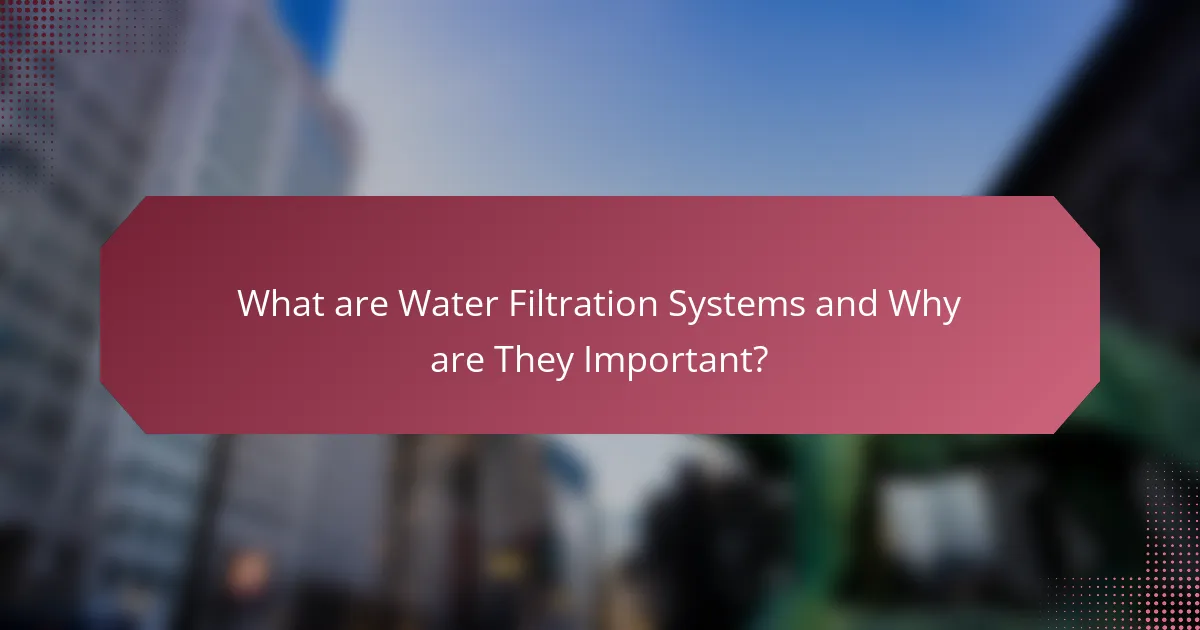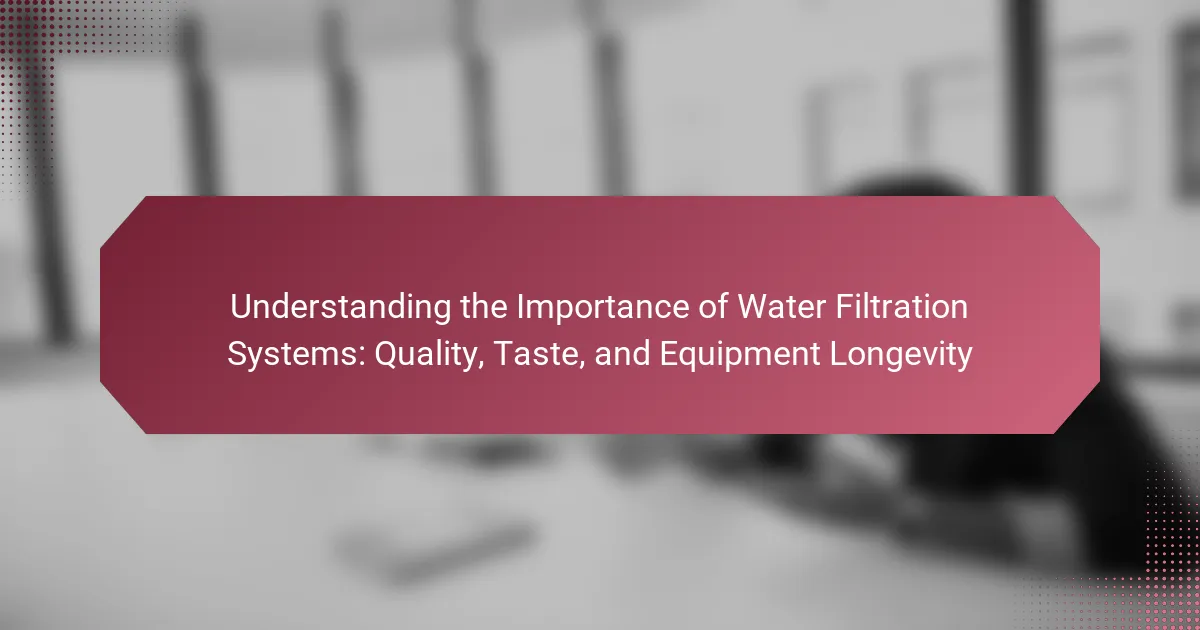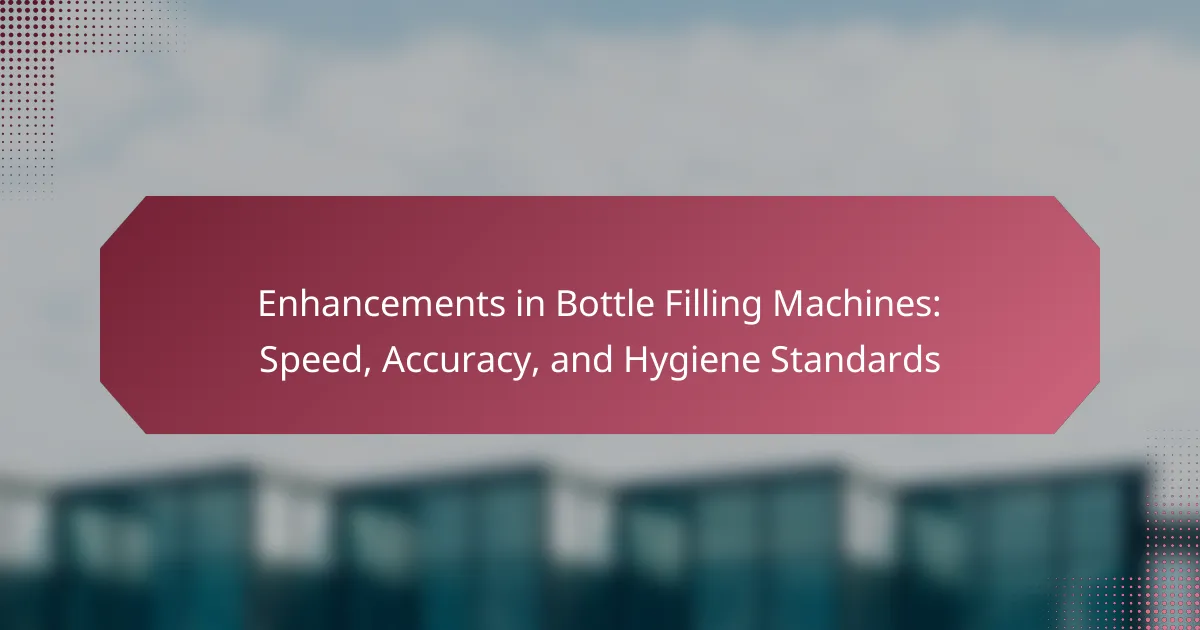Water filtration systems are essential devices that improve water quality by removing impurities such as chlorine, heavy metals, and bacteria. These systems enhance the taste and odor of drinking water, contributing to better health outcomes, as contaminated water can lead to various illnesses. Additionally, water filtration systems protect plumbing and appliances from sediment and scale buildup, thereby extending their lifespan. Understanding the importance of these systems highlights their role in ensuring safe drinking water, improving taste, and promoting equipment longevity.

What are Water Filtration Systems and Why are They Important?
Water filtration systems are devices designed to remove impurities from water. They improve water quality by eliminating contaminants such as chlorine, heavy metals, and bacteria. This process enhances the taste and odor of drinking water. Clean water is essential for health, as contaminants can lead to various illnesses.
According to the World Health Organization, safe drinking water is crucial for public health. Water filtration systems also protect plumbing and appliances from damage caused by sediment and scale buildup. Regular use of these systems can extend the lifespan of water-related equipment. In summary, water filtration systems are important for health, taste, and equipment longevity.
How do Water Filtration Systems improve water quality?
Water filtration systems improve water quality by removing contaminants and impurities. They effectively filter out harmful substances like bacteria, chlorine, and heavy metals. This process enhances the taste and odor of drinking water. Research shows that activated carbon filters can remove up to 99% of chlorine. Additionally, reverse osmosis systems can eliminate up to 95% of dissolved solids. Improved water quality contributes to better health outcomes. Clean water is essential for hydration and overall well-being. These systems also help maintain the longevity of plumbing and appliances by preventing scale buildup.
What contaminants can Water Filtration Systems remove?
Water filtration systems can remove various contaminants from drinking water. These include sediments, chlorine, heavy metals, and bacteria. Sediments can cause cloudiness and affect taste. Chlorine is often used in municipal water treatment but can create unpleasant odors. Heavy metals like lead and mercury pose serious health risks. Bacteria can cause waterborne diseases. According to the Environmental Protection Agency (EPA), effective filtration can reduce these contaminants significantly, improving water quality and safety.
How does filtration impact the safety of drinking water?
Filtration significantly enhances the safety of drinking water. It removes harmful contaminants like bacteria, viruses, and heavy metals. For instance, activated carbon filters can eliminate chlorine and improve taste. Reverse osmosis systems can remove up to 99% of dissolved solids. According to the Environmental Protection Agency, effective filtration reduces health risks associated with waterborne diseases. Filtration systems also prevent the presence of lead, which can cause serious health issues. Regular maintenance of these systems ensures consistent water quality and safety. Overall, filtration is essential for providing clean and safe drinking water.
What role does taste play in the importance of Water Filtration Systems?
Taste is a crucial factor in the importance of water filtration systems. It directly influences consumer satisfaction and preference for drinking water. Unfiltered water often has unpleasant tastes due to contaminants, such as chlorine or heavy metals. Filtration systems improve taste by removing these impurities. According to a study by the Water Quality Association, 67% of consumers prioritize taste when selecting water filtration solutions. Enhanced taste can encourage increased water consumption, promoting better hydration. Thus, taste plays a significant role in the overall effectiveness and appeal of water filtration systems.
How do Water Filtration Systems enhance the taste of water?
Water filtration systems enhance the taste of water by removing impurities and contaminants. These systems can eliminate chlorine, sediment, and heavy metals that contribute to unpleasant flavors. For instance, activated carbon filters are effective in reducing chlorine taste and odor. Additionally, filtration systems can improve the overall clarity and freshness of water. Studies have shown that filtered water is often preferred in taste tests compared to unfiltered water. This preference is due to the absence of chemical residues and particulates. The result is a cleaner, more refreshing taste that encourages increased water consumption.
What are common taste issues that filtration can resolve?
Filtration can resolve several common taste issues in water. It effectively removes chlorine, which often gives water a strong chemical taste. Additionally, filtration eliminates sediment and particulate matter that can cause cloudiness and off-flavors. It also reduces heavy metals, such as lead and copper, which can impart a metallic taste. Furthermore, filtration addresses the presence of organic compounds that can result in unpleasant odors and flavors. Activated carbon filters are particularly effective for improving taste by adsorbing these undesirable substances. Studies have shown that consumers prefer filtered water for its cleaner and fresher taste compared to unfiltered sources.
How do Water Filtration Systems contribute to equipment longevity?
Water filtration systems enhance equipment longevity by removing impurities from water. These impurities include minerals, sediments, and contaminants that can cause wear and tear. By providing cleaner water, filtration systems reduce the risk of scale buildup in pipes and appliances. This scale can lead to clogs and decreased efficiency over time. Additionally, filtered water minimizes corrosion in metal components. Corrosion can significantly shorten the lifespan of equipment. Studies have shown that using filtered water can extend the life of appliances by up to 30%. Thus, water filtration systems play a crucial role in maintaining and prolonging the functionality of equipment.
What is the relationship between water quality and appliance lifespan?
Water quality directly affects appliance lifespan. Poor water quality can lead to mineral buildup and corrosion in appliances. For example, hard water contains high levels of calcium and magnesium. These minerals can accumulate in pipes and heating elements. This accumulation decreases efficiency and can cause breakdowns. Additionally, contaminants in water can lead to rust and damage. Research shows that appliances using filtered water experience fewer issues. A study by the Water Quality Association indicates that proper filtration extends appliance life by up to 30%. Therefore, maintaining good water quality is essential for longevity.
How can filtration prevent damage to plumbing and appliances?
Filtration can prevent damage to plumbing and appliances by removing harmful contaminants. Contaminants like sediment, chlorine, and heavy metals can cause corrosion and buildup. This buildup can lead to clogs and reduced water flow in pipes. Additionally, appliances like dishwashers and water heaters can suffer from mineral deposits. These deposits can decrease efficiency and lifespan. Studies show that filtered water reduces wear and tear on plumbing systems. For example, using a filtration system can extend the life of appliances by up to 30%. Thus, proper filtration is essential for maintaining plumbing and appliance integrity.
What are the different types of Water Filtration Systems available?
The different types of water filtration systems available include activated carbon filters, reverse osmosis systems, UV filters, and sediment filters. Activated carbon filters remove chlorine, sediment, and volatile organic compounds. Reverse osmosis systems use a semipermeable membrane to eliminate contaminants. UV filters utilize ultraviolet light to kill bacteria and viruses. Sediment filters trap larger particles and debris from water. Each type addresses specific impurities, ensuring cleaner and safer drinking water.
What are the key features of reverse osmosis systems?
Reverse osmosis systems feature a semi-permeable membrane that removes contaminants from water. This membrane allows water molecules to pass while blocking larger particles, including salts and impurities. The systems typically include pre-filters to capture sediment and chlorine, extending the membrane’s lifespan. Additionally, they have post-filters to enhance taste and remove any residual odors. Reverse osmosis systems often come with a storage tank to hold purified water for immediate use. They can also include a pressure gauge to monitor system performance. These systems are known for their efficiency in providing high-quality drinking water. Studies show that reverse osmosis can remove up to 99% of dissolved solids and contaminants.
How do activated carbon filters compare to other systems?
Activated carbon filters are effective in removing contaminants from water. They excel at adsorbing organic compounds, chlorine, and unpleasant odors. In comparison to reverse osmosis systems, activated carbon filters do not remove minerals, which can be beneficial for taste. However, reverse osmosis systems provide more comprehensive filtration, including heavy metals and dissolved solids.
Activated carbon filters are generally easier to install and maintain than ultraviolet (UV) systems. UV systems require electricity and regular bulb replacement. In contrast, activated carbon filters need periodic cartridge replacement, which is less demanding.
Studies indicate that activated carbon filters can reduce chlorine levels by up to 99%. This effectiveness makes them popular for improving water quality and taste. Overall, while activated carbon filters are efficient for specific contaminants, other systems may offer broader filtration capabilities.
How can one choose the right Water Filtration System for their needs?
To choose the right water filtration system, assess your specific water quality needs. Start by testing your water for contaminants. Common tests include those for chlorine, lead, and bacteria. Identify the types of filtration systems available, such as activated carbon filters, reverse osmosis, or UV filters. Consider the volume of water you use daily to determine the system capacity. Evaluate the maintenance requirements of each system, including filter replacement frequency. Research brands and read customer reviews for reliability and performance. Finally, compare costs and warranties to ensure long-term value.
What factors should be considered when selecting a filtration system?
When selecting a filtration system, consider the water quality and contaminants present. Different systems target specific impurities such as chlorine, lead, or sediment. Assess the filtration method, including reverse osmosis, activated carbon, or UV purification. The system’s flow rate is crucial for meeting daily water needs efficiently. Evaluate the maintenance requirements, including filter replacement frequency and ease of access. Check the system’s certification by organizations like NSF International for assurance of performance. Lastly, consider the cost, both initial and long-term operational expenses, to ensure it fits your budget.
How can users evaluate the effectiveness of a Water Filtration System?
Users can evaluate the effectiveness of a water filtration system by testing the water quality before and after filtration. This involves measuring contaminants such as chlorine, lead, and bacteria. Users can utilize water testing kits available in stores or online. These kits provide quantitative data on the presence of specific impurities. Comparing results can show the reduction in harmful substances. Additionally, users can assess taste and odor improvements as subjective indicators. Regular maintenance and filter replacement schedules also contribute to long-term effectiveness. Research shows that well-maintained systems can remove up to 99% of certain contaminants.
What are some best practices for maintaining Water Filtration Systems?
Regularly replace filters according to the manufacturer’s schedule. This ensures optimal filtration performance and water quality. Check the system for leaks and ensure all connections are secure. Clean the pre-filters and membranes as specified in the user manual. Monitor water pressure to avoid damage to the system. Sanitize the system periodically to prevent bacterial growth. Test water quality regularly to ensure the system is functioning properly. Following these practices can extend the lifespan of water filtration systems significantly.
How often should filters be replaced for optimal performance?
Filters should be replaced every 6 to 12 months for optimal performance. The frequency can vary based on water quality and usage. High sediment levels or heavy usage may require more frequent changes. Regular replacement ensures effective contaminant removal. This practice helps maintain water taste and quality. According to the Environmental Protection Agency, timely filter changes enhance the lifespan of water filtration systems.
What common maintenance tasks should users perform regularly?
Users should regularly replace water filters according to the manufacturer’s guidelines. This ensures optimal filtration performance. Cleaning the filtration system is also essential. It prevents buildup of contaminants and maintains water quality. Inspecting hoses and connections helps identify leaks or wear. This can prevent larger issues down the line. Regularly checking the system for proper function ensures it operates efficiently. Scheduling professional maintenance can also be beneficial. This provides a thorough check-up and addresses any potential problems.
Water filtration systems are essential devices that remove impurities from drinking water, significantly improving its quality, taste, and safety. This article explores how these systems eliminate contaminants such as chlorine, heavy metals, and bacteria, which can lead to health issues and affect appliance longevity. It also discusses the various types of filtration systems available, their effectiveness in enhancing water taste, and best practices for maintenance to ensure optimal performance. Understanding these aspects highlights the critical role of water filtration systems in promoting health and protecting plumbing and appliances.



